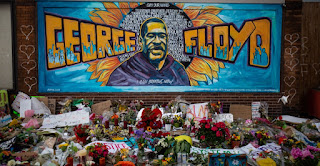This Fall, ESL students will learn more about issues of equity in their ESL classes.
SMAS Student Cristina Guisa wrote eloquently about this issue and shares her essay here.
Police Brutality Against Communities of Color
by Cristina Guisa
Student in Lisa Sparks' Summer 2020 Intensive Writing Class
Today people around the country are protesting to stop police brutality against
communities of color after a police officer in Minneapolis killed George Floyd this past May 25th.
These protests are a result of police brutality for years against African Americans. “From 2013
to 2019 police in the U.S killed 7,666 people according to data compiled by mapping police
violence”[1] and “African Americans are two-and-a-half times as likely as white Americans to be
killed by police”[2]. Some people in the country are just saying that these protests are looting
and they don’t see the problem for communities of color. The truth is that protesters are asking
for justice, and If immigrants or non-citizens want to combat this problem they need to know
their rights, to demand for changes to the government and to raise inclusive families.
Immigrants or non-citizens need to know their rights in the U.S to participate in this
massive fight against police brutality. Immigrants are also a minority in this country therefore
they need to know how to react if they or any other person are in this situation but especially to
act now and support all communities of color. No one should be in danger just because of the
color of their skin.
More people in more communities need to demand equality, justice, fair treatment and
accountability from their government leaders by writing letters or protesting peacefully to make
changes. For example, making a change in the way police officers’ offence records are
maintained so that these police officers cannot be dismissed. This way they can be reviewed
and tracked to avoid unjustified abuse, and if necessary to expel officers who are taking
advantage of the system. For example, people should ask police departments to keep a history
of the use of deadly force by each officer. If a police department finds an officer incapable of
doing his/her job because of bias or power abuse, then they should not be employed by any
other police department. These rules should apply to all police agencies in the country. [3]
In addition, families should give inclusive education to their children to raise men and
women without any racial bias. Families who teach their sons and daughters how to be inclusive
and to treat all people in the same way can eradicate racism forever. All humans who have
grown up with values and beliefs which they learned from their families are now just a reflection
of them. If from the beginning more people take action inside their own families, less racist
people are going to be in the world.
In sum, if people from other communities want to eradicate police brutality they must
know their rights, demand changes from the government and raise inclusive families for a better
future. When people in a country are aware of their rights and know how to react against
injustice, they can make positive changes in their communities. For all these reasons, all
communities from any background should prepare themselves and find a way to participate and
help black communities now.
[1] , [2] Mapping US police killings of Black Americans
[3] Police Accountability: Last Week Tonight with John Oliver (HBO)
https://www.youtube.com/watch?v=zaD84DTGULo
NBC Nightly News Broadcast (Full) - May 26th, 2020 | NBC Nightly News
https://www.youtube.com/watch?v=YzCPz3gClrc
 |
| George Floyd Mural |

No comments:
Post a Comment